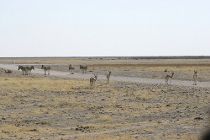UNCCD calls for ministers to focus on desert lands to combat climate change
The UN Convention to Combat Desertification (UNCCD) is calling for ministers at climate change talks in Cancun, to not only focus on a deal to combat deforestation, but also to focus on desert lands, to combat climate change.

The UN Convention to Combat Desertification (UNCCD) is calling for ministers at climate change talks in Cancun, to not only focus on a deal to combat deforestation, but also to focus on desert lands, to combat climate change.
Luc Gnacadja, Executive Secretary of UNCCD and Environmental Minister of Benin, is urging delegates from the 194 nations at 16th Conference of Parties (COP16) to include the two billion people that live in the world's driest areas, in a follow up deal to the Kyoto Protocol.
In an interview with Agence France-Presse (AFP), Gnacadja said: "Those who cut the deal failed to put forests fully into the Kyoto Protocol so we lost a decade and a half. Now we are thinking of a deal for after 2012. We hope that the world will not make the same mistake now by not including the potential of the soil in arid lands."
An estimated four per cent of annual greenhouse gas emissions come from arid desert lands. However, if these lands were restored they could store carbon – although at a lower level than forests, which has been an important topic at COP16.
Deserts are largely unrecoverable, but Gnacadja hoped that the topic of regenerating lands that are at risk of desertification would be approached in Cancun. He is hoping that mitigation promises in the latest climate aid package will help nations adapt to the effects of climate change, which in this case is the approaching threat of desertification.
"When you stock and sequestrate carbon to the soil, not only do you reduce emissions – at the same time, you increase the soil fertility and productivity, the capacity of the soil to hold water," said Gnacadja.
This year the UN inaugurated a decade for deserts and the fight against desertification, which affects 12 million hectares of agricultural land, equivalent to the size of Greece or Benin.
More than 40 per cent of land across the planet is dry, and home to 2.1 billion people. 90 per cent of that land is in developing countries with high levels of poverty and nearly one billion of its people face the threat of food shortages every day.
Due to global warming, deserts are expanding which threatens access to water as well as the possibility of droughts and floods. If an aid package meant that areas would be recovered for agriculture it would help secure food for more than nine billion people, experts say.
Carlos Nobre, Director of the Brazilian Institute for Spatial Investigations, said: "A tropical forest system retains much more carbon than a semi-arid system, and in between there are grasslands which retain it inside the ground – a slow process with large potential."
Nobre carried on to say, on drylands sub-humid systems store between 40 and 50 tonnes of carbon per hectare underground, compared with between 120 and 150 for a tropical rainforest. Semi-arid lands store only 10 to 15 tonnes per hectare.
Delegates are hoping that the Cancun talks, ending on Friday (December 10), will reach an agreement on how developed nations can help developing countries by way of a climate fund. Devloping nations are hopeful that the fund will be put towards the preservation of tropical forests, which are at risk from deforestation due to the paper and pulp industry, as well as other issues affected by global warming.
Author: Charity Knight | Climate Action
Image: Dr.Warner | flickr


_-_frame_at_0m5s_400_250_80_s_c1.jpg)



